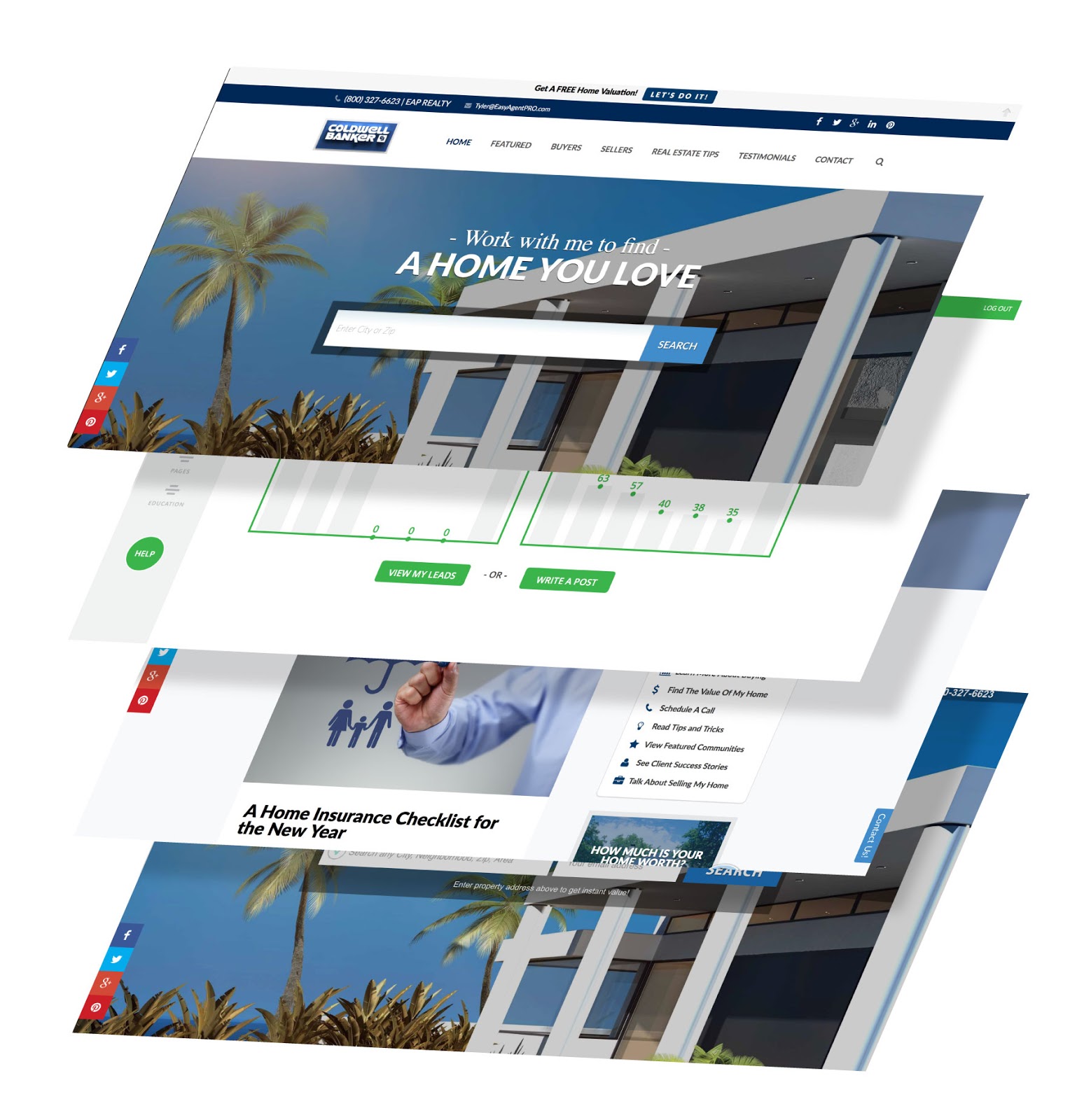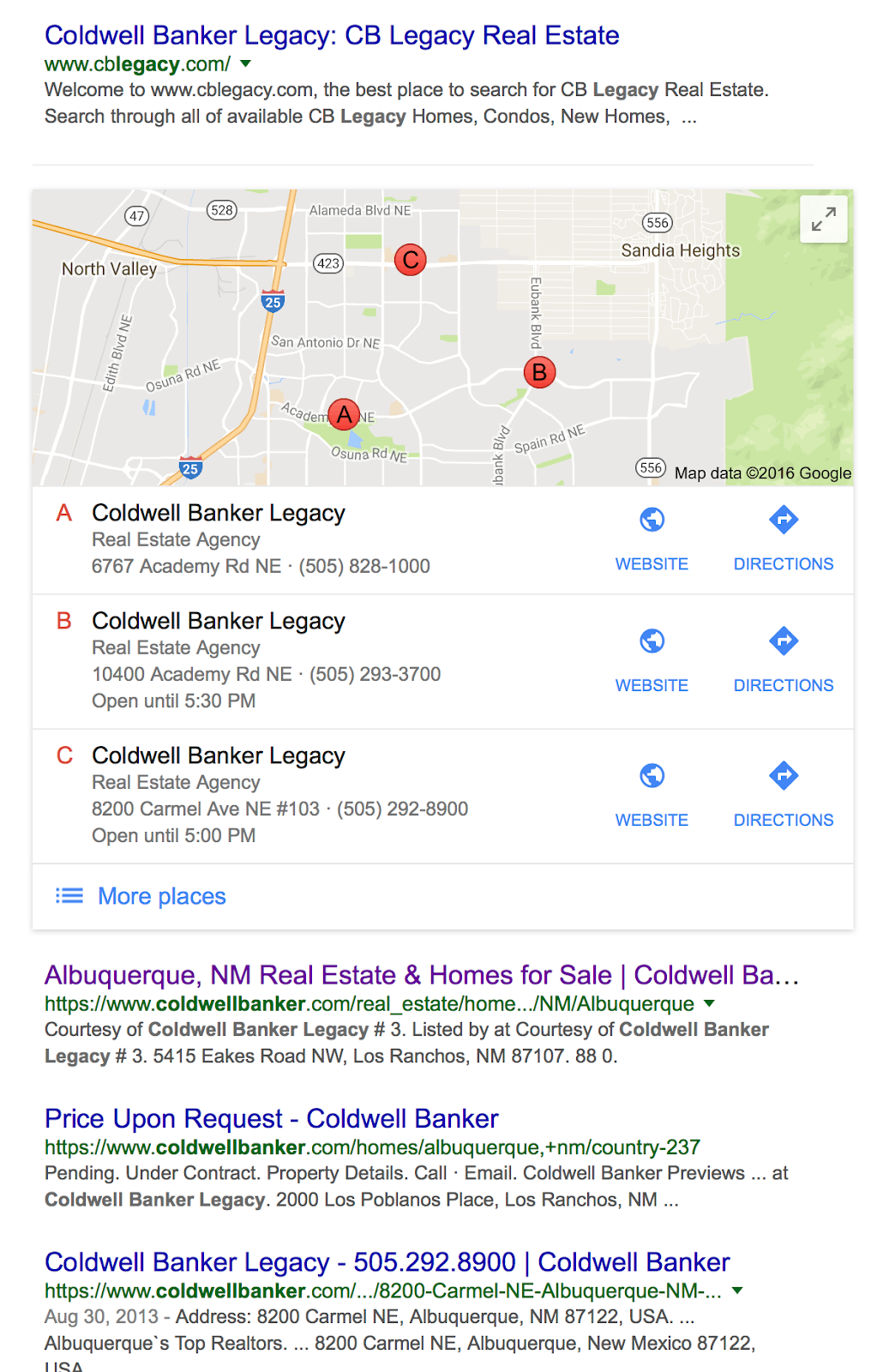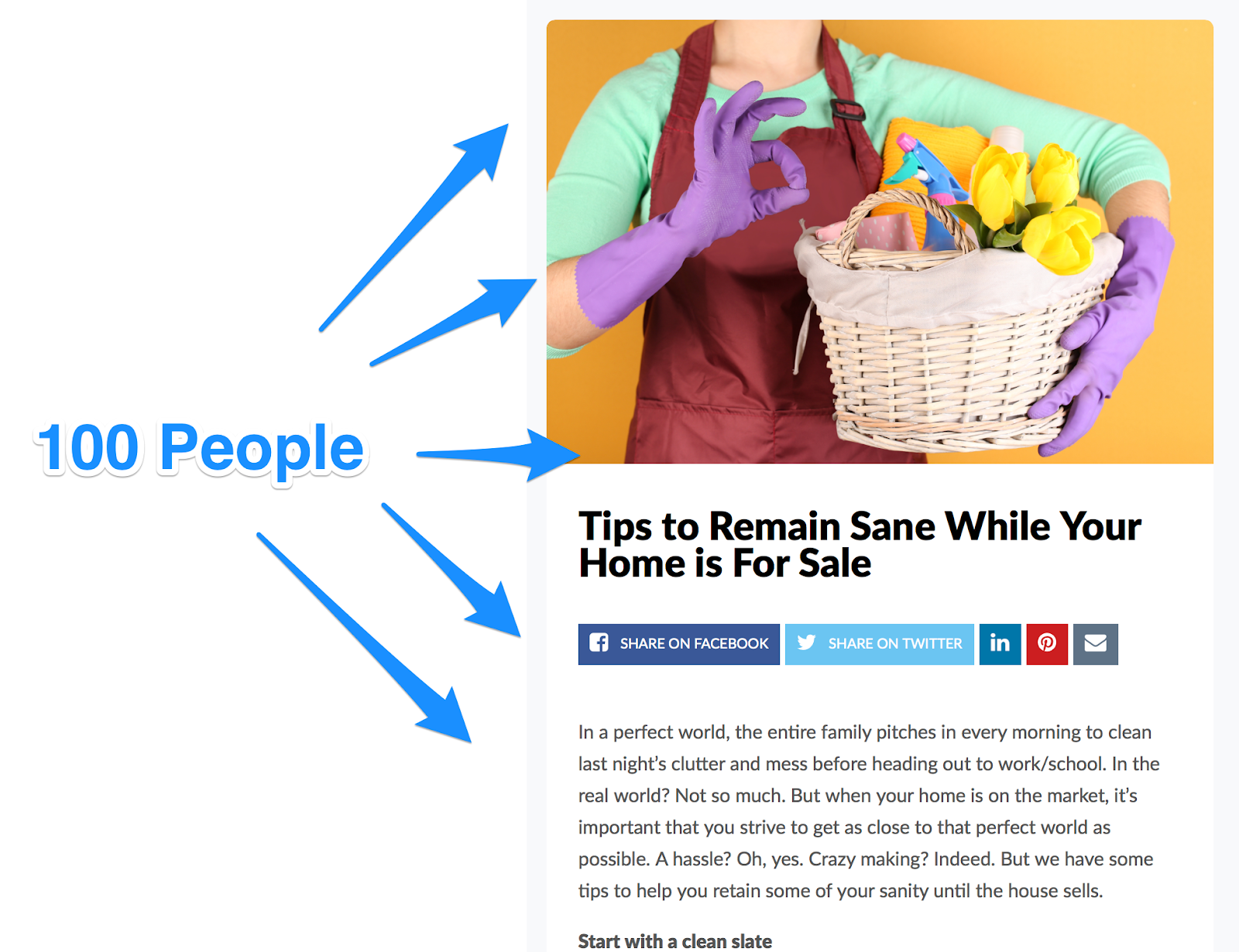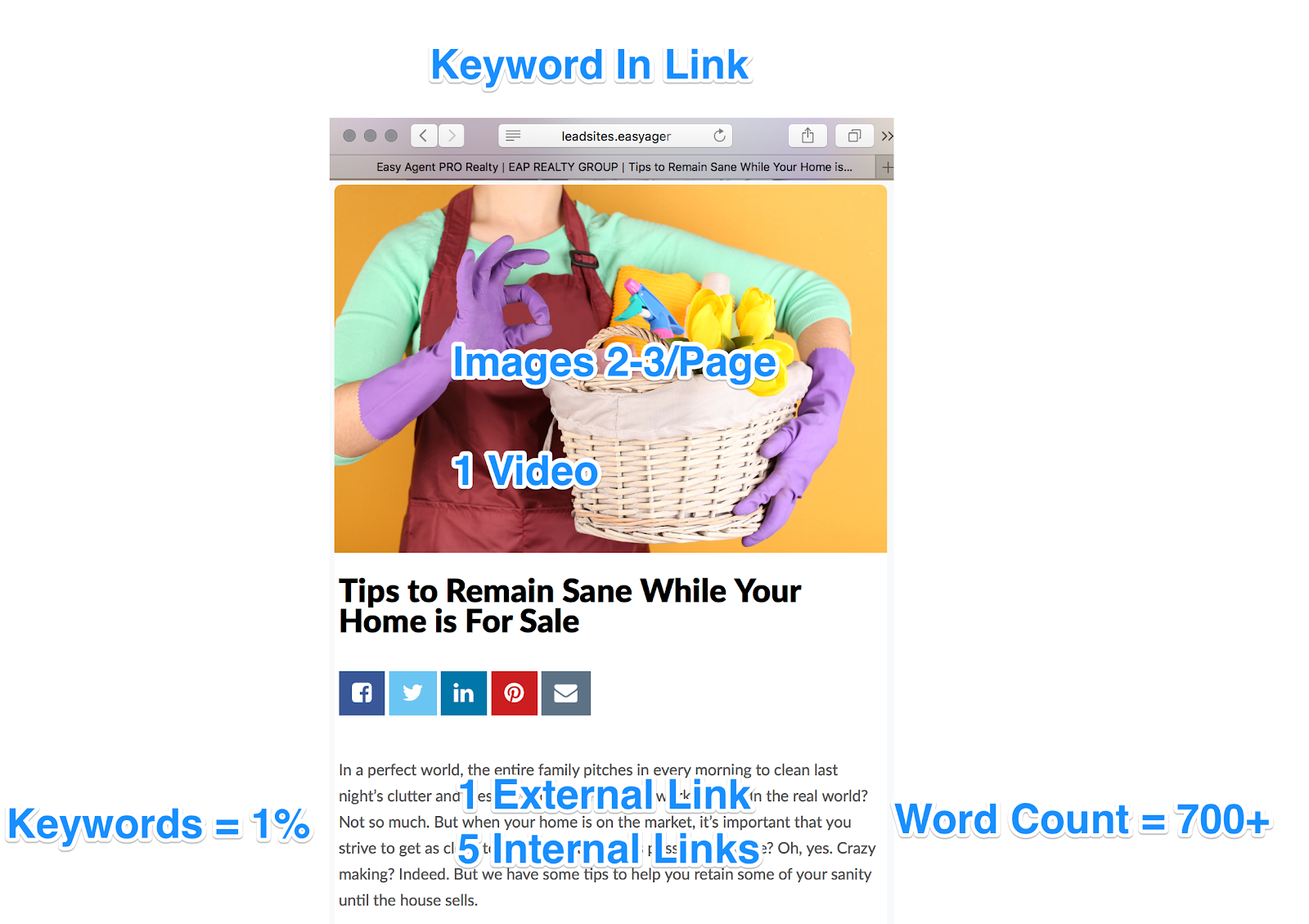SEO is easier than you think.

Goal Setting
What are we going to accomplish?
What’s your goal?
What specifically would you like to accomplish in the next 30 Days, 90 Days, 6 Months?
Maybe you’re looking to promote your brand recognition, rank for neighborhoods and communities, or get on the first page of Google as an authority in your area.
Set a personal goal for yourself and write it down below. (This step is important!)
30 Days: I would like to...
90 Days: I would like to...
6 Mths: I would like to...
Before we get too far...
Read this first!
Small, Daily Change:
Before we start talking about the specifics of ranking on Google, we want to cover something first.
Easy Agent Pro believes that the only way to achieve results is through small, daily change.
We use the phrase Kaizen to describe this.
Why does this matter?
We’re about to give you a lot of information. You’ll probably feel overwhelmed. Or you might be tempted to try and tackle this all right away.
The best strategy, and the one we recommend, is to approach SEO with small daily changes.
Read through the guide today... start picking out your keywords today... but don’t try to create all the pages for your keywords today.
It’s been proven over and over that websites will not rank on Google unless they are frequently updated. This means you rank better on Google the more you post.
Take your time and create quality pages for every keyword you wish your website to show up on Google for. This will take more time. But the results will be much better.
Ok, so now you should have some clear goals! Let’s get into it...
What’s The Point Of SEO?
A lot of people get this wrong.
Goal #1:
Show Google who you are (brand + name), what you do (real estate + niche), and where you do it (your city + target communities).
Goal #2:
Prove to Google that you are the best / most qualified website to send traffic to. This is usually accomplished by having high quality content for visitors to read, by gaining traffic over time, and by focusing on delivering REAL VALUE for your visitors.
When you produce valuable content Google picks up on things called “Social Indicators” that happen naturally as people read/share/interact with your content. The better your Social Indicators, the higher your search engine rankings and traffic will be.
Warning: No matter what you hear or read online, there is no way to “hack” Google into giving you higher rankings. Things like fake traffic / excessive use of keywords etc used to work in the early days of SEO, but are frowned upon by Google today.
Terms And Definitions
What does it all mean?
- SEO: This stands for Search Engine Optimization. SEO is the practice of creating pages on your website that are designed to rank highly on Google. The odd thing about this whole practice is that Google has never told anyone exactly how their algorithm (code) works. So, this has lead to a lot of speculation around what actually gets websites on the first page of Google. This guide contains everything that we’ve concretely seen work for getting websites on the first page of Google.
- Keywords: A keyword can be any word or phrase that someone types into Google. Google crawls the billions of websites on the internet and in milliseconds displays the best ones. This guide will show you how to find keywords (and keyword phrases) that are easy to show up for on Google. You should have one page per keyword on your website.
- Meta Titles: Meta title is a high-tech sounding word but is really just another word for your Google Page Title. The Find Me app will easily allow you to edit the Title of your page and make sure it is formatted in a way that Google can understand. PRO TIP: Always insert your target keyword into your post title ie. “Guide To Buying Santa Fe Horse Properties”
- Meta Description: Meta description is a fancy word that references the description you see in search results under the Meta Title. PRO TIP: This is often the first few lines of text on a post or page, but can also be used to write a call to action targeted at search engine visitors.
- Word Count: This is the number of words written on a page or a post. Google uses word count as a major indicator of quality content. PRO Tip: We’ve seen the best results come from 500-700+ word content. Find Me will calculate your word count automatically and let you know when you have passed 500 words.
- Keyword Density: Keyword density describes how many times your keyword was used out of the total words. The formula looks like this: Keyword Density = # Of Times Keyword Used / Word Count
- Permalink: A permalink references the words that come AFTER your domain name ie. mydomain.com/sellers mydomain.com/buyers mydomain.com/blog. You can adjust this setting easily in Find Me. PRO Tip: Add your target keyword into your permalink, helps Google understand what your page is about.
- InstaFarm: InstaFarm is a custom app by Easy Agent Pro that helps build SEO neighborhood pages. These pages are designed to perform well on Google. And contain all the proper SEO content.
- FindMe: Find Me is one the most loved apps at Easy Agent PRO. Why? Because it makes SEO simple and shows you step-by-step how to optimize any page or post you are creating. You’ll find the main interface at the bottom of a post where you can control Meta Title, Meta Description, Permalink settings. Find Me will also check your content for word count, keyword density, link usage, and more.
- Links: Links are clickable words in an article, InstaFarm, or page that direct the visitor to another page. Google likes links because they are how Google discovers more content. Google treads links almost like a vote for a page. The more link a page gets; the more likely Google is to rank it highly.
- Inbound Links: Inbound links happen when you link internally to another article on your own website. These are very useful for sending traffic between community pages or to popular posts.
- Outbound Links: Outbound links are links that direct traffic to other websites. These are more useful in the eyes of Google. The more outbound links that are pointed to your website the better you will show up on Google.
- Anchor Text: Anchor text refers to the text that the link is on. For example, “Easy Agent Pro” the words Easy Agent Pro are the anchor text and “https://www.easyagentpro.com/tv/” is the link. Anchor text is important because Google uses it to understand what the page you are linking too is about. You should use your keyword of the article you are linking too as the Anchor Text. For example, you should link to your InstaFarm page for a neighborhood when saying the name of that neighborhood on various other pages.
- Sitemap: A sitemap contains a list of all pages on your website. You LeadSite contains 2 sitemaps. One is for Google and the other is for humans. You can see them under APPS > FindMe.
Researching Keywords
How do I get started?
There are a few recommended Keyword tools in the list below.
Google Keyword Planner
Soovle
Ubersuggest
Wordstream
Instructions:
The goal here is simple: We’re going to find our target keywords and divide them into short term and long term categories (easy to rank for / harder to rank for).
This way, we’ll have some easy wins along the way that will help us achieve the big win - your BIG Keyword.
Below, you’ll find 4 types of keywords. This exercise is designed to make you think creatively and help you systematically find easy to rank for phrases in your community.

Keyword Formulas
The 4 Types Of Keywords
Competitive Longterm: Search for your BIG Keyword that get’s the most traffic on Google.
Examples
San Diego Homes For Sale (Huge Traffic)
Pacific Beach Homes For Sale (Huge Traffic)

Lifestyle Niches: Search for those keywords related to a lifestyle niche you enjoy working with. These will be less competitive and show low (or no) Google search traffic.
Examples
Top Golf in Albuquerque (Low Traffic - Easy Win)
Places to eat in Albuquerque (Low Traffic - Easy Win)
Top Restaurants in Albuquerque (Low Traffic - Easy Win)
Fun things to do in Albuquerque (Low Traffic - Easy Win)
Best dog parks in Albuquerque (Low Traffic - Easy Win)

Micro-Communities:
Search for small communities and subdivisions that are not extremely popular in your local area. A good rule of thumb for these is that Zillow, Trulia, and/or Realtor.com do not show up on the first page yet.
Examples
Names of new condos being built (Low Traffic - Easy Win)
New home subdivisions (Low Traffic - Easy Win)
Nicknames of communities (Low Traffic - Easy Win)

Branded Terms:
People search for everything these days. And that includes your business address and phone number. Branded terms are keywords like your name, team name, brokerage name, and more that you need to show up highly for on Google. If you don’t rank for these terms, you are losing business. These are your 1st priority.
Examples
Tyler Zey
Easy Agent Pro Address
Easy Agent Pro reviews
Keller Williams Real Estate Agent

Keyword Planning
Let’s find our focus keywords
Keyword Planner Worksheet
Pick out 5 keywords for each category that you are going to focus on.
Competitive Long-term: (cities)
ie. Pacific Beach Homes For Sale
1)
2)
3)
4)
5)
Lifestyle Niches: (relocation, lifestyle)
1)
2)
3)
4)
5)
Micro-Communities: (subdivisions)
ie. Grey Oaks Kansas City
1)
2)
3)
4)
5)
Branded Terms: (your name/reviews)
ie. “Ty Zey - Easy Agent Pro”
1)
2)
3)
4)
5)
Once this is done, you should have everything you need to start creating content that will rank on Google. Print this sheet out check off keywords every time you add them to a piece of content.
Ranking For Terms
Get found by Google
General Guidelines:
You have now created roughly 20 keywords. The general rule of thumb for these keywords is that you’ll create one InstaFarm page or a blog post per keyword.
These pages should be created regularly and we suggest starting with one per week.
Secondly, you need to promote everything you create. Your goal should be to get 100 people to that specific link within the first week. This will help Google recognize the page and will dramatically help it’s rankings.
Each Week = 1 Piece of Content + 100 People Reading It

TITLE/META Description

SEO CHEAT SHEET
Steal this and keep it safe!
SEO CHEAT SHEET
- WORD COUNT: All SEO content needs to be a minimum of 700+ words long. If you are struggling to create content this long, look at these cheatsheets made by Tyler.
- KEYWORDS: Use your keyword (or keyword phrase) 1-3% of the time. If you have 1000 words, the word or phrase should be used 10+ times.
- IMAGES: Use 2-3 images per page. These should be images related to the content your talking about. Images you’ve taken of the community, homes nearby, or iconic locations are great.
- VIDEOS: You should embed one YouTube Video per page. It should be related to the topic of the page.
- PERMALINK: Your URL or link for your post should contain the keyword.
- Example: yoursite.com/blog/keyword -- or -- yoursite.com/keyword
- LINKS: You should include 1 external link per page
- You should include 5 internal links per page
- LINK TEXT: Keyword as link text for those links (example: Real Estate Websites)

Promoting Your Content
Ways to get your content shared
Promoting Your Google Content
Your number one goal after publishing anything on your website is to get 100 people to see it. This will help Google recognize the page and will dramatically help it’s rankings.
There are several ways of accomplishing this goal. Here’s the one we recommend:
- Email: When you publish anything to your website, it’s a good idea to alert everyone in your CRM of the new article. You can do this by simply emailing them a friendly message like the following:
- Hi there, I’ve just wrote something about [INSERT TITLE].What do you think about it? Is there anything you’d add to the writeup?Let me know, Tyler
- Pinterest: Pinterest is another great source of traffic for websites. If you’re new to Pinterest, you should read this article on Easy Agent Pro. If you’re more experienced, here’s how to promote your SEO’d article there.
- Facebook Groups: There is a growing number of Facebook groups online that you can post in. You have to watch the rules per each group for posting. Here’s an article explaining how to post in groups and get traffic from them if you aren’t familiar with the practice.
- Facebook Page: You should post your article to your Facebook page in order to get traffic back to your website.
- Local Associations, Businesses, And Organizations: Don’t underestimate the power of local associations! You can email your article directly to them if you feature them. And request that they share it with their sphere. This is a great way to get businesses, associations, and organizations sharing your posts via email and Facebook.
Get Linked To!
How to get other sites to link to you
Links To Your Website Homework:
In addition to promoting your content, you need to get links to your website. These links help Google find your specific optimized pages. And thus Google starts to rank them higher.
You’ll read a lot of information on the web about getting links to your website. The fact is most of it is untrue. In the real estate industry, a few quality links for other local websites is more than enough to help you get to the first page of Google.
Our formula is easy:
Figure out 3 people who you’d like to get links from.
+
Send them an email with everything they need to say “YES”.
Need help figuring out what to say? Check out the templates below!
Sample Guest Post Paragraph
Hi John,
I recently made this video reviewing Brookside and your business in a positive light. Have you seen it?
Anyway, if you’d like, I’d be willing to write 200-300 words about the video for you to post on your website. Let me know if you’re interested.
Best,
Tyler
Sample Collaboration email:
Hi Top Golf marketing team,
Just want to say I absolutely love your place! We had a blast hitting balls the other day.
(Something flattering ^^)
My name is Tyler and I run a real estate blog in CITY. I wrote an article about you guys last week that is getting some great response from my readers. Here’s a link : LINK
(Introduction ^^)
I’m going to be promoting this article on Facebook Ads next week and wanted to see if you all would mind sharing it as well? If you need an intro or anything I’d be happy to write 200-300 words for you.
Best,
Tyler
Sample Interview Email:
Hi favorite restaurant in my city,
By the way I Love your tacos! But that’s not why I’m writing you.
( Something flattering ^^)
My name is Tyler and I run a real estate blog here in CITY.
I’m putting the finishing touches on an article titled Top 10 Restaurants in City and wanted to let you know that I am adding you guys to the list!
(Benefits ^^)
I’ll be promoting this hard on social media and would love to hear your story.
(Benefits ^^)
Would you be open to doing a quick 5 minute interview about your restaurant?
(Ask to work together ^^)
Sincerely,
Tyler
3 People Who Can Link To My Content
Subject of Your Article:
What would you like from them?
Person or Company:
Contact Info:
Value That You Offer Them: